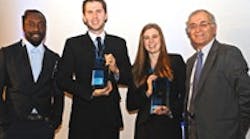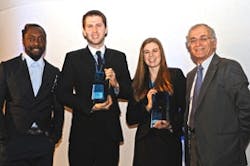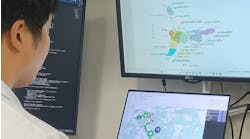"Elevator pitches" have reached a new height, thanks to an innovative competition run by the U.S.'s National Academy of Engineering (NAE), Washington, D.C., and the U.K.'s Royal Academy of Engineering (RAE), London. Such "spiels" — summarizing something and its value so briefly that a person could effectively convey the information during a chance (or, perhaps more likely, deliberate) encounter with someone on an elevator — generally just involve talking. Now, however, with the increasing popularity of tablets like iPads, video potentially can enhance the message — and open up new opportunities for sharing it via the Internet. That's clearly what the two engineering bodies hope.
Charles Elachi (far right), director of the Jet Propulsion Laboratory, and entertainer Will.i.am (far left) present trophies to Katie Speights (middle right), a chemical engineering student at the University of Texas at Austin and Paul Clarkson (middle left) of Rolls-Royce, Derby, U.K., for their videos promoting engineering.
In conjunction with the first Global Grand Challenges Summit, which the two groups along with the Chinese Academy of Engineering held in mid-March in London, the NAE and RAE invited 18–27 year olds to submit a two-minute-or-less video that highlights engineering's importance and how engineers tackle global challenges.
NAE and RAE ran separate competitions but jointly announced the winners at the summit. Charles Elachi, director of the Jet Propulsion Laboratory, and entertainer Will.i.am presented trophies to Katie Speights, a chemical engineering student at the University of Texas at Austin, for "The Water Energy Nexus," and Paul Clarkson of Rolls-Royce, Derby, U.K., for "The Promise of Engineering."
Speight describes her winning effort thusly: "This video examines the relationship between water and energy, challenging the idea that the water crisis is just a problem of clean drinking water. Here, the crisis is explained as an interdisciplinary problem with ample opportunities for unique solutions. It is shown that although engineers play a vital role in the development of these improvements, we ultimately need help from others to create lasting solutions."
Clarkson's video explores what engineering involves and argues that engineers are crucial for addressing a key challenge of today — achieving a sustainable world.
"The winning U.K. film 'The Promise of Engineering' was chosen because of its clear, positive message to promote engineering and how engineers can address grand challenges. Its excellent use of voice-overs combined with the edited footage resulted in an inspiring film that is accessible to a wide audience," comments Sir William Wakeham, senior vice president of the RAE and one of the U.K. judges.
Each group also commended other videos. NAE noted four runners-up: "Engineering Urban Infrastructure" by a group from Washington University, St. Louis, Mo.; "We Build Things" by Hunter Douglas of Duke University, Durham, N.C.; "Brain Computer Interface (Reverse-Engineering the Brain)" by Karuna Relwani and T. J. Collanto of the University of Pittsburgh; and "PSU HESE Affordable Greenhouse Venture" by a group from Pennsylvania State University, University Park, Pa. RAE cited "Let's Engineer a Better World" by Adarsh Chuttooar of GlaxoSmithKline, Barnard Castle, U.K., and "The El Salvador Project" by Robert Wright of Imperial College London.
You can see the U.S. videos at www.nae.edu/Projects/GCShortVideoCompetition/70210.aspx. The U.K. videos, along with seven others, appear at www.youtube.com/user/GGCSFilm.
Entrants could use any production technique and approach. So, the tone and look of the videos vary significantly. For instance, one contains animated drawings while another features an original song. Separate panels of judges assessed U.S. and U.K. submissions.
The U.S. judging panel consisted of Li-Te Cheng, a software engineer at Google; Lizabeth Fogel, director of education for the Walt Disney Co.; Larry Johnson, CEO of New Media Consortium; and Beau Lewis, co-founder and head of business of Seedwell.
Besides Wakeham, the U.K. judges were Kate Bellingham, a television reporter who has been active in promoting science/technology/engineering/mathematics careers; Jamie Gallagher, a PhD student and science/engineering communicator; Roger Highfield, director of external affairs for the Science Museum Group; Anji Hunter, director, the Queen Elizabeth Prize for Engineering; Ian Ritchie, chair of Iomart; and William Webb, CTO of Neul.
"I loved judging these films. They showed such diversity of creative thinking and execution — like engineering itself," notes Hunter.
The two-day London event was the first of a series of global summits planned by the three engineering groups.




